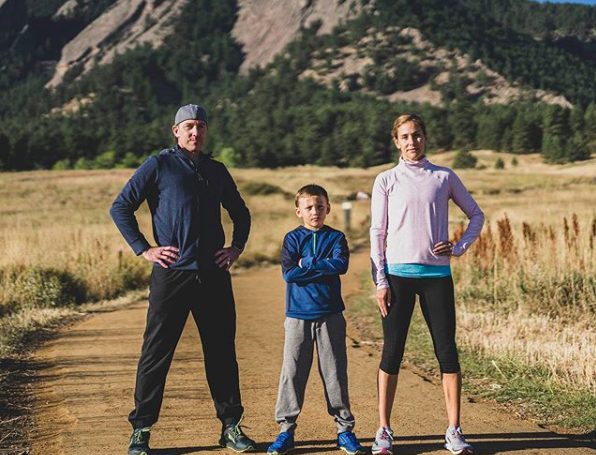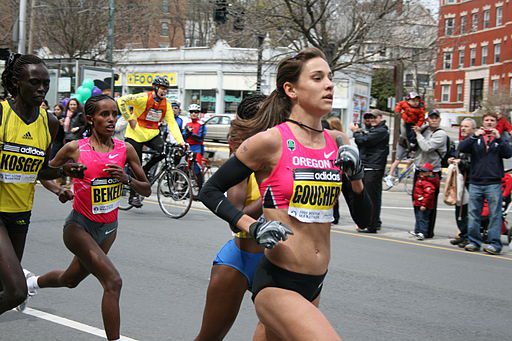Kara Goucher speaks to the media about Salazar
Kara Goucher expresses relief that her eight-year journey to expose her former coach as a drug cheat has ended in a ban, but says it should be for life, and his program shut down

Last week’s news that the Nike Oregon Project head coach Alberto Salazar and Houston-based endocrinologist Dr. Jeffrey Brown had been issued a four-year ban for doping violations came in the middle of the World Championships, which wrapped up in Doha on Sunday. Marathoner Kara Goucher, who was a Nike Oregon Project athlete from 2004 to 2011 and who, along with former NOP assistant coach Steve Magness was one of the main whistleblowers in the case, spoke to a number of media outlets on Friday and Saturday, asking that they refrain from publishing her comments until the conclusion of the World Championships. Stories have now appeared on the BBC site, Women’s Running, the New York Times, the Clean Sport Collective podcast, and WBUR 90.9.
The American Arbitration Association found Salazar and Brown guilty of numerous doping violations, including trafficking in testosterone (a prohibited substance under WADA rules), infusing his athletes with synthetic L-carnitine (which helps the body convert fat to energy) far in excess of allowable limits, and altering evidence. None of Salazar’s athletes has ever failed a drug test. Nine NOP athletes (besides Goucher) testified before USADA in the investigation.
RELATED: BBC journalist unpacks Alberto Salazar story
I appreciate the interest in my reaction to the Salazar and Brown cases. I’d like to wait to share my thoughts until after the world championships so that the focus can be on the athletes competing there. Thank you for understanding.
— Kara Goucher (@karagoucher) October 2, 2019
Salazar has coached athletes like Goucher, Sir Mo Farah (who left the NOP in 2017), Galen Rupp, Jordan Hasay and Sifan Hassan to extraordinary levels of success. Goucher won silver in the 10,000m at the 2007 World Championships and competed in the 5,000m and 10,000m at the 2008 Olympics and the marathon at the 2012 Olympics. She has transitioned from the roads to the trails and is currently training for The North Face Endurance Run, a 50K trail race in California in November. In June, she finished fifth and won the W40-49 age group at the Leadville Trail Marathon in Colorado.

Rupp and Hasay are the two fastest Olympic marathon trial qualifiers, and both are scheduled to race the Chicago Marathon this Sunday. Hassan won gold medals in both the 10,000m and the 1,500m in Doha (despite Salazar being barred from the premises after the ban went into effect on Tuesday, between the two events). Farah is a four-time 5,000m and 10,000m Olympic gold medallist and is slated to defend his title at Chicago this year.
https://www.instagram.com/p/B3UyFGTJd0b/
The public first learned of Goucher’s and Magness’s involvement in the investigation in 2015 with the release of a BBC Panorama documentary in conjunction with ProPublica, the American website that investigates abuses of power. Goucher describes losing a six-figure sponsorship contract and being harassed and barred from races. She told Women’s Running that “people involved in the sport at the very elite level that I have to see on a constant basis have tried to ruin my career behind the scenes, told people not to work with me and tried to blacklist me from things.”
RELATED: Kara Goucher has harsh words for Nike Oregon Project

In the Women’s Running interview, Goucher says that after eight years, she almost couldn’t believe the news that Salazar had been found guilty and received a ban. She expresses satisfaction that he was sanctioned, but says four years is not long enough, that he should be banned for life and the NOP shut down. She also questions why some of Salazar’s current athletes (and Nike) continue to defend him, and said they should “do the right thing” and leave the program. She describes Rupp as being part of an “inner circle” that she was never part of, and she says that not all NOP athletes are in the inner circle and that they are not all dirty.
The NYT story describes 10 years of whistleblowers like Goucher and Magness being “ridiculed, castigated and dismissed, as those who take on people in positions of power often are.” It identifies Danny Mackey, a Brooks coach and former NOP athlete and sports scientist, as the first whistleblower, back in 2009. Mackey went to USADA after becoming concerned about whether the testosterone and unnecessary thyroid medication he was on were legal, and quietly left Nike for another shoe company 18 months later. Goucher went to the FBI in 2011 and USADA in 2013, concerned that Salazar was routinely abusing the TUE (Therapeutic Use Exemption) system in order to administer unnecessary medications.
https://www.instagram.com/p/B2kdaxtp0lA/
Magness told USADA that Salazar was applying AndroGel (a topical testosterone cream) on his sons’ arms (who were not athletes) to see how much would trigger a positive drug test. When confronted with this, Salazar claimed it was a defensive measure designed to foil sabotage by competing athletes or therapists. Goucher said she never observed this and never participated in any testosterone or L-carnitine experiments.
Goucher told the NYT that while she never participated, she was “part of a culture that was so manipulative and so controlling and so wrong.” She described wanting to come forward long before she did, fearful that her own career results would be questioned, and realizing that as long as she remained silent, she was “part of the problem.” For Goucher, the final straw came as she was trying to resume training in 2012 after giving birth to her son Colt, and Salazar wanted her to take an unnecessary prescription thyroid medication to help her lose weight and boost her testosterone. Her husband, Adam Goucher, is also a former NOP athlete.
— Kara Goucher (@karagoucher) October 7, 2019
She told the BBC, “If I was Nike I’d be bringing in some new coaches and move on from this Oregon Project, because clearly it had principles not in line with clean sport and we have to just start over.” She told the BBC that all NOP athletes’ samples, including her own, should be re-tested.
Goucher says Salazar was warm and fatherly towards her at the beginning of their relationship, and that she valued the relationship all the more because she lost her own father when she was a young child. “I feel like that person died,” she told Women’s Running. “The person I know now, I don’t feel anything toward. It’s impossible for me to understand how it’s the same person. I feel like he died.”
“We went up against the biggest company in the sport’s world and one of the biggest coaches in the world and got this done,” Goucher told Women’s Running. “It is worth it.”
Salazar and Nike denied any wrongdoing. Salazar has said he will appeal the decision, and Nike has expressed its support.


